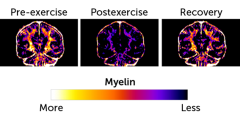A multicentre research team has examined the effect of marathon running on myelin (the structure that envelops the axons of neurons). The results show that it undergoes sharp overall decline and gradually recovers thereafter. This finding reveals that brain energy metabolism is more complex than previously thought. The use of myelin as brain fuel opens up new insights into the brain's energy requirements.
Brain communication is governed by energy-intensive electrical and chemical signals. It is estimated that the brain consumes 20 % of the total energy used by the human body, even though it only accounts for about 2 % of its weight, and its main source of energy is glucose. Researchers from the University of the Basque Country (UPV-EHU), CIC biomaGUNE, CIBERNED, Biobizkaia and Achucarro, among others, led by Carlos Matute, professor in the Area of Human Anatomy and Embryology at the UPV/EHU carried out a study in which they wanted to see “what happens to the brain when this source of energy is at a minimum, as occurs during prolonged physical exercise over time, for example, a marathon or an ultra-marathon”.
Prolonged endurance exercise mobilises energy reserves throughout the body to meet energy demands. Carbohydrates are the main source of fuel; as these reserves are depleted, the body begins to rely more on stored fat as a source of energy, and ultimately, if necessary, the body can break down muscle proteins to use them as energy. “The results of our study indicate that nerve cells in a state of hypoglycaemia (low glucose) rely on alternative energy sources, such as myelin, a fatty structure that envelops the axons or nerve fibres that enable the neurons to communicate, and facilitates the ultra-fast propagation of electrical signals,” explained Matute.
The importance of understanding myelin function
The study, which is drawing international attention, has revealed that marathon running reduces the myelin content of runners in much of the grey and white matter of the brain, in some regions more than in others, and with a similar impact on both hemispheres. This loss of myelin recovers after the race, and two weeks on completion of the effort its levels are almost back to normal. “It is a reversible process as the amount of myelin normalises with rest following the extraordinary demand for energy; but if it is prolonged to excess it could have functional implications for the brain,” explained CIC biomaGUNE’s Ikerbasque Research Professor Pedro Ramos-Cabrer.
To conduct the research, they used magnetic resonance imaging to scan the brains of several marathon runners on the days before and after the race, and then two weeks later. One or two days after the race, the team observed “a reduction in the amount of myelin in the brain. Within two weeks, the myelin levels were back to normal”, said Matute.
This dramatic overall reduction in myelin content following prolonged exercise, and recovery after decreased physical activity, opens up a novel insight into myelin as an energy store ready to be employed when typically used brain nutrients are in short supply. “The brain's energy metabolism is more complex than is currently known. The use of myelin lipids (fats) as brain fuel opens up new insights into the brain's energy requirements, which have an impact on the nutrition of the population in general, and on the performance of athletes in particular,” he added.
“These results, which need to be confirmed with more cases, open up lines of research that could even link neurodegenerative diseases with alterations in energy metabolism and open up new avenues for the treatment of these diseases. It is a new, ground-breaking line of work that has a lot of promise,” said the CIC biomaGUNE professor.
Professor Matute explained that this study is very important “for understanding demyelinating diseases, such as multiple sclerosis, in which the disappearance of myelin and, therefore, the energy supply to the axons, leaves the latter malnourished, and facilitates structural damage and degeneration”. In addition, the ageing of myelin with the advancing years exerts negative effects on cognitive functions, and may contribute to the onset and aggravation of neurodegenerative diseases such as Alzheimer's.
The results of this work break new ground on the energy role of healthy, aging and diseased myelin in the brain. “Although we have shown that in healthy individuals myelin is used up by exercise and can be replenished naturally with rest and a healthy diet, as people age and in diseases such as multiple sclerosis and Alzheimer's, the quantity and quality of myelin decreases for various reasons in each disorder, and does not recover spontaneously. So it would be necessary to intervene early at the onset of these diseases, or preventively, in order to reduce the progressive deterioration of myelin, either with an ad hoc diet, or with drugs to enhance its use as a source of energy and its replenishment during rest,” concluded the University of the Basque Country professor.


